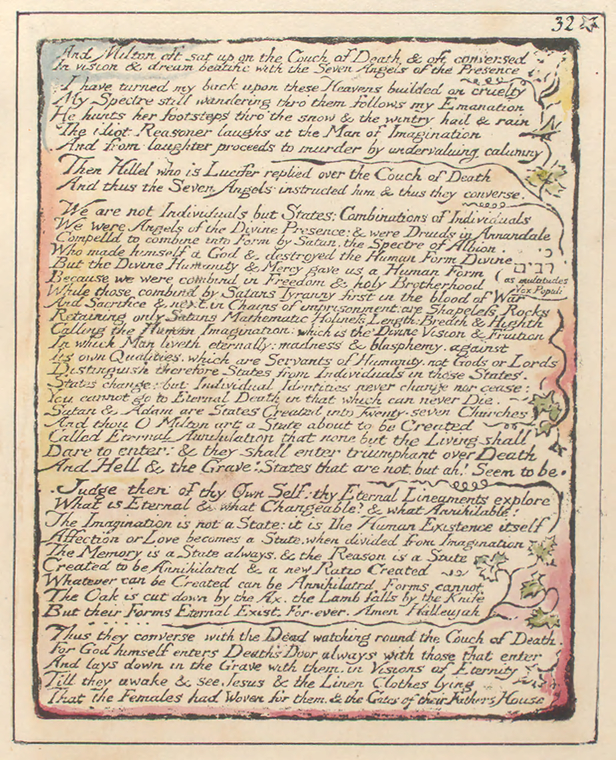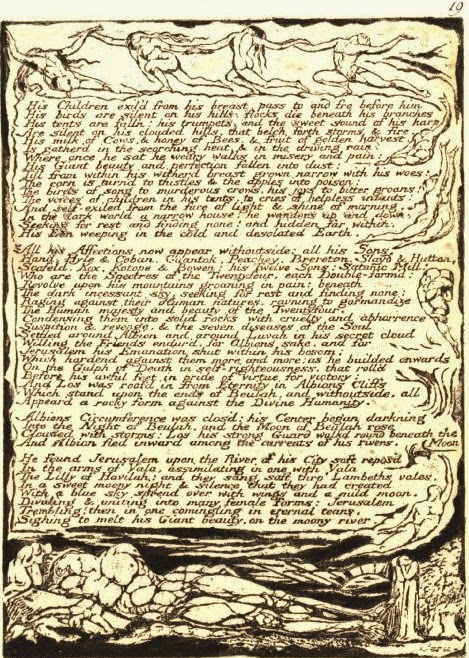The poem which Blake most often used as the concluding song of Innocence is On Anothers Sorrow. Andrew Lincoln in William Blake, The Illuminated Books, Volume II, tells us that, "This song echoes many of the preceding poems, and elaborates some of the central themes of Innocence."
He cites these Bible verses as inspiring Blake's imagery:
Matthew 10:29
[29] Are not two sparrows sold for a farthing? and one of them shall not fall on the ground without your Father.
Revelation 7:17
[17] For the Lamb which is in the midst of the throne shall feed them, and shall lead them unto living fountains of waters: and God shall wipe away all tears from their eyes.
Isaiah 53:3-4
[3] He is despised and rejected of men; a man of sorrows, and acquainted with grief: and we hid as it were our faces from him; he was despised, and we esteemed him not.
[4] Surely he hath borne our griefs, and carried our sorrows: yet we did esteem him stricken, smitten of God, and afflicted.
John 16:20
[20] Verily, verily, I say unto you, That ye shall weep and lament, but the world shall rejoice: and ye shall be sorrowful, but your sorrow shall be turned into joy.
Andrew Lincoln:
"This song reveals not only the emotional appeal of this state of the soul, but also its limitations. The speaker's vision of comfort is presented in terms that seem to exclude the possibility of parental indifference, of callous disregard for suffering, or of a world where children might be chimney sweeps or slaves. The woes remain undefined, seen only in relation to the sympathy they should elicit. The vision seems to leave no room for moral outrage. For this we have to leave the state of Innocence, and enter the turbulent state of Experience." Page 170
British Museum
Songs of Innocence and of Experience
Plate 13, Copy A
|
Songs of Innocence, Plate 27, (E 17)
"On Anothers Sorrow
Can I see anothers woe,
And not be in sorrow too.
Can I see anothers grief,
And not seek for kind relief?
Can I see a falling tear,
And not feel my sorrows share,
Can a father see his child,
Weep, nor be with sorrow fill'd.
Can a mother sit and hear,
An infant groan an infant fear--
No no never can it be.
Never never can it be.
And can he who smiles on all
Hear the wren with sorrows small,
Hear the small birds grief & care
Hear the woes that infants bear--
And not sit beside the nest
Pouring pity in their breast,
And not sit the cradle near
Weeping tear on infants tear.
And not sit both night & day,
Wiping all our tears away.
O! no never can it be.
Never never can it be.
He doth give his joy to all.
He becomes an infant small.
He becomes a man of woe
He doth feel the sorrow too.
Think not, thou canst sigh a sigh,
And thy maker is not by.
Think not, thou canst weep a tear,
And thy maker is not near.
O! he gives to us his joy,
That our grief he may destroy
Till our grief is fled & gone
He doth sit by us and moan"
Perhaps the
greatest impact can be gained from the poem by reading it from
an emotional point of view. Throughout the poem we are asked to
look upon the sorrow of others, or empathize with those who bear
the sorrows of others. It is the innocent who bear the woes, and
those who love them who weep over them. Innocence does not
protect the children, the parents, the birds, or the infants.
The reversal of their condition must come from beyond the
natural world. To Blake the source of
one's comfort is given in the present by the God who is also a
Man. The ever present companion who bears our grief and shares
the joy of Eternity, is to be experienced as man's difficult
journey continues. .




